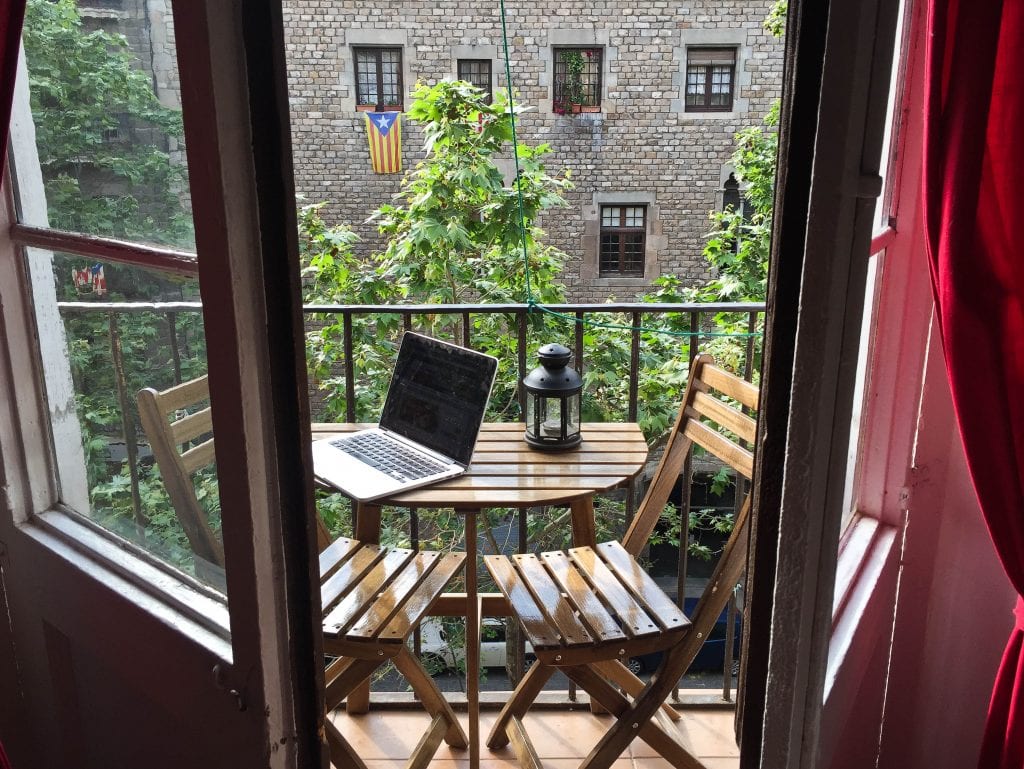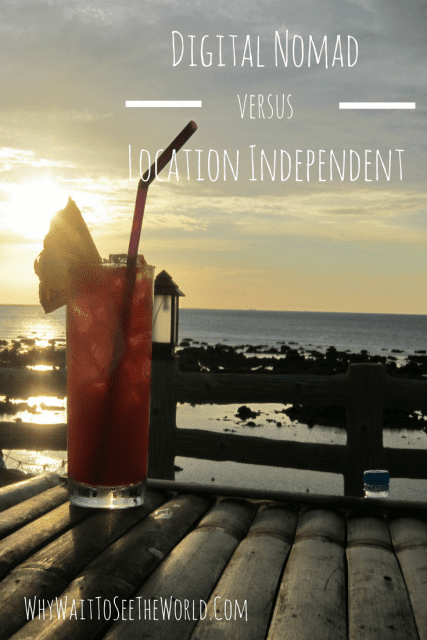This post is about more than terminology I swear.
Hang around travel blogs for a while and you will start to see certain words bandied around quite a bit. “Digital Nomad” and “Location Independent” are two phrases you will see, often interchangeably. But they are actually two different things.
I was reminded of this when I read this great little article on Digital Nomad Soul on Why the Digital Nomad Lifestyle is not Sustainable. I agreed with a ton of points the article brought up, especially when he talks about how while the Digital Nomad lifestyle might not be sustainable, the Location Independent Lifestyle is.
This is something I know, very, very, very well. I was a Digital Nomad for four years, and I’ve been Location Independent with a home base, for three now.
What’s the difference and why does one work better long term?
Contents
Defining Digital Nomad
Digital Nomads are our generation’s version of a traveling salesman or maybe a wandering bard. These people make a living with their laptops, and have made the decision not to have a home base. Like turtles, they carry their homes on their back, going where wind, or opportunity, take them.
Lots of bloggers and world travelers aspire to be digital nomads because well, it’s kind of awesome. See the world, make money while you do it, work from a laptop on the beach (don’t do that last one- it’s a great way to get sand in your keyboard).
The biggest advantage of being a nomad: total freedom. You aren’t tied to any one place by leases or responsibilities. For this reason it’s especially appealing to young, single people, but you will find all sorts of people out there doing this, including families.
What It’s Like to Be a Digital Nomad
I was a Digital Nomad for years. After quitting my desk job I managed to eek out a very modest living running what was then Twenty-Something Travel. I worked from I worked from makeshift desks while backpacking in South East Asia, crashing in a dorm room in China, from a high rise in Buenos Aires and even from a camper van in Australia. The longest I stayed in any one place was 6 months, and it was often much less. For years the only fixed address I had was my Mom’s house.
Being a digital nomad is working in new coffee shops, connecting with other nomads around the world, and making travel plans on a whim. It’s valuing wifi more than air. It’s working odd hours and taking conference calls in hostels. It’s living out of a suitcase and wearing the same clothes until they disintegrate. It’s calling any stay longer than two weeks a “home base.” It’s celebrating New Year’s in Ecuador or Bangkok or wherever you happen to be, with whoever you happen to be with.
Those years were crazy and fun- I racked up dozens of passport stamps, had lots of adventures and worked against some fabulous backdrops. It was all great fun but it wasn’t quite the dream lifestyle many make it out to be.
I spent a lot of time working- most of my time working. When Mike and I were living in Mexico we struggled to tear ourselves away from our computers long enough to go to the beach a couple times a week. We couldn’t travel as much or as frequently as we wanted because we needed time to work.
Working on the road is not the same as taking a vacation. There’s a paradox to being a nomad: the more you travel, the less time and money you have to work, but the more you work, the less energy you have to travel. Most of my time working on the road was a struggle to find the balance between these two poles.
Why Digital Nomads Go Home
It’s hard to believe you could get tired of the globetrotting lifestyle but nearly everyone does eventually. The article I mentioned above sums up the issues well, but in short: constantly moving can be exhausting, it does a number on you psychologically and it’s hard to meet a significant other or start a family (although certainly not impossible).
For Mike and I, our abandonment of the nomadic lifestyle was rooted in shifting priorities. I found myself longing for the stability of a home base. I would day dream about owning my own couch, cooking in a kitchen that was decently stocked, going out to happy hour with friends I’d known longer than a week or two. The travel life was starting to feel one dimensional. We weren’t having that much fun anymore.
It’s difficult to form meaningful relationships when you are constantly moving around. I was lucky enough to have met someone as crazy as I am, before I started traveling, but most nomads struggle with dating and friendships.
The last factor: we knew we wanted to start a family, and we didn’t want to be living out of a suitcase while we did it. So we pulled the plug on our digital nomad years, and I don’t think either of us have regretted it at all.
Defining Location Independence
We didn’t just go back to the 9-5 grind though. What we transitioned to was something far better (in my opinion anyways).
Being location independent simply means that you are not bound by your job to living in a certain place. All digital nomads are location independent but not all location independent people are digital nomads. You can be location independent but choose to have a home base. This is far more sustainable long term.
I’m a freelance writer, which means I can work just about anywhere. Mike works for Automattic, a company that is fully remote- meaning he can do his job from anywhere in the world with an internet connection. We chose to live in Seattle simply because we wanted to, but we are not tied here by our employers.
Life as a Location Independent Worker
Being Location Independent but having a home base has really been the best of both worlds. We have the steady comforts of home, but a flexibility that opens up a wealth of options. We can vacation in Japan for 3 weeks and work from Tokyo for one of them. We can go visit our family on the East Coast for weeks on end. Most significantly, we can pick up and move this whole show over to Italy with no disruption to our work lives.
Being Location Independent is having a place to hang your travel souvenirs. It’s having a dog, an external monitor, a favorite coffee shop down the street. It’s perfecting my meatball recipe and going to happy hour with my college roommate. It’s observing weekends. It’s really knowing a city the way only a local can. It’s traveling purposely, not aimlessly and really appreciating where and when we do go places.
It’s not perfect either: it’s having to find a dogsitter when we go out of town, making sure we have the money in our bank account to pay the lease each month, it’s moving abroad, but still working on Eastern time. It’s saying no to things. It’s responsibility mixed with freedom.
Why Location Indepenence is Sustainable
Over the years I have watched more and more of my digital nomad friends make this switch. Kate got an apartment in Harlem. Dave and Lauren moved to Lisbon. Amber and and Eric chose Girona. Even strong holdouts like Sherry finally got a lease in Denver after ten (!) years living on the road. I could go on, I know literally dozens of people who have made this transition.
Simply: being LI is easier, and in the long term it just feels better. Everyone likes to feel like they’re building something, working towards something. You can build a business on the road, but you can’t build a life.
What’s Right For You?
Now I’m really not knocking the Digital Nomad experience. It was exactly that: an amazing experience that I’m so glad I had, and equally glad I’m not having anymore. Maybe someday I might make the switch again, for at least a little while.
If you can find a way to be location independent- either by working for yourself, or working for a remote company, then you have a wealth of options open to you. If you want to be nomadic, absolutely go for it! Just don’t cling to that idea past its expiration date. Because once the thrill is gone, it’s gone for good.
It’s okay to evolve. Going home can actually be a totally new kind of beginning.
Pin for Later:








